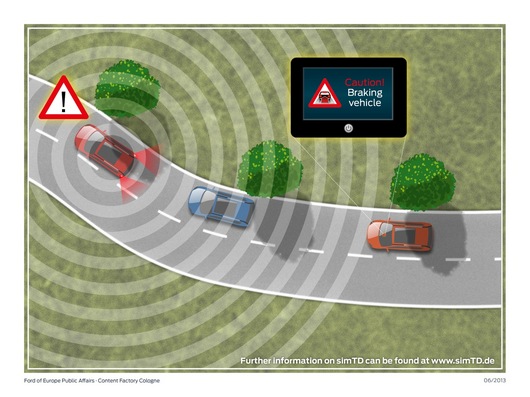Brake lights are simple – step on pedal, red lights in the rear light up and the drivers behind you know you are slowing down. But what about those blind curves where you have to stop in the middle of the road? How would you let someone coming up behind you know you are stopped if you have taken your foot off the break, avoiding injuries among both of you?
Ford has a vision of an experimental system called Electronic Brake Light technology — an odd moniker, as all brake lights are typically electric — which is capable of wirelessly communicating with other vehicles on the road. Demonstrated in Frankfurt as part of Safe Intelligent Mobility – Testfield Germany (or simTD), a group of Euro market Ford S-Max vehicles equipped with the experimental brake lights showed they could send a signal that illuminates a light on the following vehicle’s dashboard.
The following driver now knows when the lead vehicle is decelerating, even when visibility of the brake lights is obstructed by weather (such as heavy fog, snow, or rain), other vehicles, or terrain (such as when cresting a steep hill or rounding a severe bend).
Though LED technology may largely render blown taillights a relic of the past, my hope is that this technology could also let the following driver know when leading vehicle’s taillights are not functioning, granting critical reaction time to avoid a rear collision. It would be nice to see these wirelessly communicating brake lights chatting it up with existing traffic services, perhaps notifying navigation providers of traffic on a road if too many of these smart brake lights are lighting up the grid.
Of course, the Electronic Brake Lights, their wireless technology, and the other technologies demonstrated at simTD are still in the experimental testing phase. No word has been given or plans announced to implement them in any current or future vehicles. But wouldn’t it be nice to never have to feel so concerned as to look in the rearview mirror every time you stop, hoping that if a car comes up too fast, you will have enough time to react?



